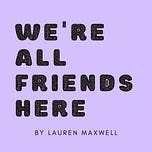
You can get into a rut of constantly wondering what the next thing is — am I going to get it, am I going to make it, whatever that means — but there’s enough to go around. If you focus in the moment, then you have all you need.
Welcome back to Let’s Talk, a series of conversations about life’s biggest questions. Today, I’m thrilled for you to meet John Young Shik Concklin.
John Young Shik Concklin is a conductor, violist, and nonprofit advisor based wherever the work is. As a conductor, he's served on the faculties of Vanderbilt, Furman, Clemson, and Converse Universities, worked with numerous orchestras, including the Nashville Symphony and the Atlanta Symphony, and conducts the Piedmont Chamber Orchestra and the Atlanta Music Project, an organization for music-as-social-change. As a nonprofit operative, he advises organizations, political campaigns, and governments on public policy, strategy development, and data analysis. John also holds a seat in the Greenville Symphony Orchestra as a violist and co-founded Mozart for a Cause, an annual benefit concert, with me.
Spoiler alert: John and I are married.
In this episode, we explore how it felt to have the rug pulled out from under him as an artist last spring and why he believes in making music — even now. We also talked about his zen approach to career, or how he cultivates trust in the long game, despite the future of music being uncertain.
We discussed how hard — and rewarding — it has been to try to shape a life around our values and remain dedicated to that path together.
When it comes to racial justice, John talked about impacting his personal spheres of influence and how he thinks people and organizations might attempt values-level change. We explored ways the virus has made today’s big issues acutely obvious, and why art can’t thrive until humans can count on basic things like survival.
We also talked about the importance of inviting people to be part of the revolution rather than shaming them, which interestingly, is the same approach he uses when standing in front of orchestras. Making music, he says, is a people business.
Listen above or find us in your favorite podcast app.
When exploring whether or not art is truly essential in the world as we know it, John offers:
Covid has blown the lid off all the things that were already plaguing us. We live in the 21st century, in the richest country in the world. Why are some people worried about survival? That shouldn’t be a thing. So why would we expect anybody who’s struggling to survive to show up to an orchestra concert? That’s got to be the last thing on their mind.
He adds:
It blows me away that there were so many people, pre-Covid, that in spite of working hard and being good people, were devalued by whatever capitalist economy we have that says they’re not worth survivability… It seems inhumane. And then we wonder why art can’t thrive. It’s because, as a society, we hold weird, barbaric values that are the antithesis of humanity.
John also reflects on how his relationship to music has changed as a result of this pause. He still spends hours learning music each week:
Because I’m not conducting, the scores I’ve been learning have, in silence, somehow become more alive and vibrant. And maybe it’s because I miss standing in front of orchestras. But if you do these pieces over and over again, it’s hard not to remember the last performance, the sound of the last orchestra. Because it’s been months now, I start to imagine new sounds, which has been fun.
Thanks for listening! If you enjoyed this conversation and want to hear more thoughtful people exploring the big questions of our time, check out earlier episodes of Let’s Talk wherever you get your podcasts. I’ve loved every single one.






Share this post